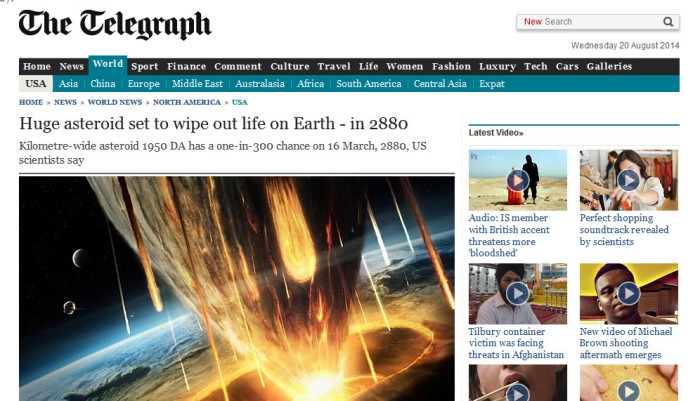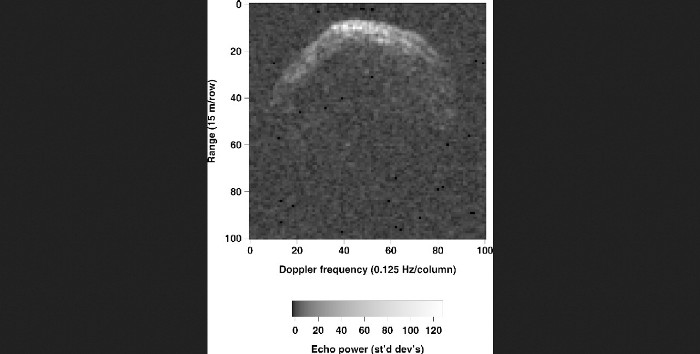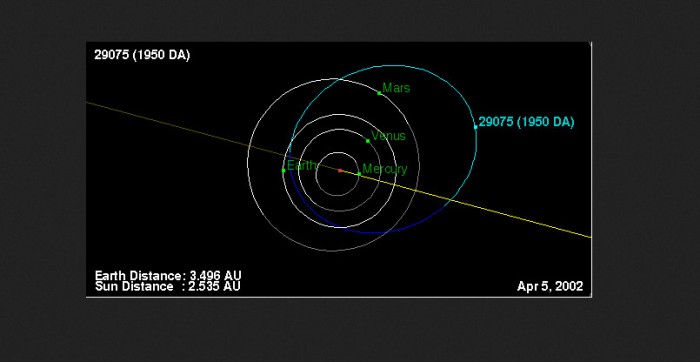A Giant Asteroid Will Hit Earth in 2880? Be Wary…of Our ‘Journalists’
If you’ve read the August 15 edition of UK’s The Telegraph, you could be one of those who were unnecessarily worried for your posterity as an asteroid called 1950 DA was reported to supposedly wipe out life on Earth in 2880. Fortunately, this “news” isn’t really accurate. No, you don’t have to despair that the grandchildren of your grand grandchildren won’t be seeing life on Earth a number of centuries from now.
As Slate’s Phil Plait clarified things, asteroid 1950 DA is “very, very unlikely” to whack Earth in 2880. For Plait, at best, The Telegraph’s headline is “hugely misleading.”
Telegraph’s “Misleading” Report
According to The Telegraph’s report, a kilometer-wide asteroid is set to wipe out life on in March 16, 2880, quoting United States scientists. The UK broadsheet newspaper is said to be spinning at an “impossible” rate as it hurtles toward Earth, “on track to wipe out human life.” The asteroid has a one-in-300 chance of heating Earth on March 16, 2880.
The Telegraph is basing its report on information supposedly provided by researchers at the University of Tennessee. The researchers are said to be already studying ways to throw the asteroid off its course. The research is published in the journal Nature. It travels at a speed of nine miles per second and rapidly spinning (1 rotation per 2.1 hours). The asteroid’s speed and rotation are said to enable it to defy gravity. Such combination of fast rotation and speed is expected to cause the asteroid to fly apart but there are cohesive forces that hold it together. These forces are called van der Waals and have not been observed in asteroids studied in the past.
Further emphasizing the gravity of the threat, The Telegraph mentioned the extent of the possible impact. The asteroid is believed to hit Earth with a speed of 38,000 miles per hour, causing an impact that is equivalent to the explosion of 44,800 megatons of TNT. This amount of force can cause giant tsunamis and alterations in the atmosphere that can rapidly change climates and lead to the destruction of human and a great deal of animal life.
As reported by The Telegraph, the University of Tennessee researchers involved in the study believe that blowing up the asteroid would amplify its threat by causing multiple impacts. Instead of blasting the asteroid, they think that it would be better to induce changes on the asteroid’s surface to destroy the force that keeps it together and cause it to disintegrate before reaching a dangerous proximity to Earth. Unfortunately, because of its size, it’s not possible to make use of the NASA technology to “abduct asteroids.”
Plait’s Contention
For Slate’s Plait, the answer to the question whether or not Asteroid 1950 DA would hit Earth is “yes, kind of.” Phil Plait, by the way, is an astronomer and science evangelizer who authors the blog Bad Astronomy and the book “Death from the Skies.“ Plait’s position is that there is really a huge uncertainty in predicting the path of asteroids especially when making predictions over extensively long periods.
Plait seeks to clarify that the already very low 1/300 impact probability reported by The Telegraph is immensely far from the probability of impact calculated by NASA. On NASA’s Near Earth Objet Program page, the figure posted show an impact risk that equates to 1 in every 4,000 (1/4,000) or 2.48 x 100-4. The analysis is based on 8 radar delay, 5 Doppler, and 454 optical observations that span nearly 30,000 days. The 1/300 probability reported by The Telegraph is based on an old calculation also by NASA.
Plait does not hide his disdain for The Telegraph, specifically pointing out how he loathes the newspaper’s “predilection for printing global warming denial.” Unfortunately, The Telegraph’s story has been picked up by several media outfits including Daily Mail, The independent, Mirror, and various Asian papers. Even MSN UK picked the journalistic errors.
Sensationalizing stories is nothing new and it’s good to know that some astronomer with a wide-reaching enough online reputation is clarifying things for everyone. The bottom line: there are no asteroids to fear at the moment. For now, it’s certain “journalists” people should worry about. The fear and panic they cause probably bear more risks than all the asteroids in the universe. It’s bad enough that newspapers are venturing into sensationalism and fear-mongering. They’re making things even worse as they erroneously report scientific details.


